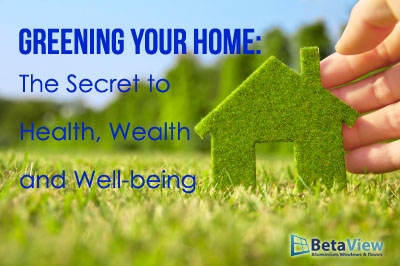Have you had the opportunity to shop around for aluminium windows prices yet? Windows don’t have to be among the priciest of home improvements, there are deals to…

Greening Your Home: The Secret to Health, Wealth and Well-being
Could you imagine living in a world without plants? Considering that plants are such an integral part of everyday life, probably not. After all, a world without trees, grass and flowers doesn’t sound too pleasant at all.
Now, could you imagine living in a home or going to work in an office without plants? Maybe you already do, or maybe you’re one of those people with a green thumb that brings life to all that you touch. Whether you’re the world’s greatest gardener or a plastic plant connoisseur, greening your home impacts not only the environment, but your mood and productivity as well.
Maybe it’s because we’re still hardwired as hunter gatherers from our caveman days but, as humans we crave nature in our environment from our kitchens to the office. Here are three ways that plants can enhance your surroundings, making you healthier, wealthier and more productive.
Turn Your Home into a Green-House
Did you know that increasing the number of plants in your home or office can have a direct impact on your health and well being?
In fact, studies have shown that introducing plants into your immediate environment can reduce stress, lower, blood pressure and increase creativity and productivity. One study showed that plants increased productivity in the office by 10-15% and the effect was even more noticeable for people who worked on computers.
If you are like most people, you probably already have a few plants in your home. That’s a good thing since plants also keep you healthier and reduce airborne bacteria by over 50%. But, those aren’t the only reasons to stock up on a few lush, green houseplants.
Houseplants add an element of beauty to a home as well, adding a touch of life and colour to any room in your home. Not surprisingly, plants make people calmer, alleviate depression and increase optimism, and they can also lower your energy bills.
Create a Garden and Keep it Green
Having a small home garden reduces stress and provides exercise while giving you a reason to spend some time outdoors. You don’t have to be a master gardener to create a small herb or veggie patch in your own yard or tend to a few plants in your windows. Here are a few things you can do to save money and energy by increasing the number of plants in your yard and home.
- Plant natives they will require less water and maintenance.
- Grow fruits and vegetables, they’ll cut down on trips to the supermarket and they’re the cheapest organic produce you’ll ever get!
- Use small solar powered lamps for lighting instead of electric to save energy.
- Plant shrubs and deciduous shade trees around your home. They’ll provide shade and help cool your home in the summer and keep your home warm during cooler months.
- Water early in the morning and at dusk to avoid evaporation and never water on windy days.
With all those plants you’ll be growing, you’re going to need plenty of nutrient rich fertilizer to keep them green and healthy year round. A compost heap out in the back of your yard is a great way to ensure that your plants grow strong and healthy while reducing the amount of waste that you throw into the trash.
Start a Compost Heap
A compost heap is a great way to save energy and cut down on the volume of trash you throw out on a weekly basis. In fact, about half of what you throw away is compostable. This includes items that have a high nitrogen and carbon content such as:
- Fruits and veggies
- Shredded paper and cardboard
- Yard clippings like grass and leaves
- Horse or cow manure
- Egg shells
- Coffee and tea grounds
You can even compost pet fur, vacuum residuals, lint from the dryer and fire place ashes. What you don’t want to put in your compost heap is anything that isn’t biodegradable. So, things like oil, or that spoil easily such as dairy or meat and of course, anything with chemicals in it such as household cleaners are no-no’s.
Follow these 3 tips and you can create an environment in your home that is healthy, productive and sustainable. Plus, you might find that even if you don’t think you have a green thumb, growing a few plants can be a rewarding pastime.
Categories
- Aluminium Doors
- Aluminium Windows
- Bi-Fold Doors
- Causes We Support
- Contracts and Business
- Double Hung Windows
- Energy Efficiency
- Events / Trade Shows
- FAQ Series
- Hinged Doors
- Home Decor Tips
- Home Renovation
- Home Security
- Infographics
- Louvre Windows
- Other
- Outdoors
- Sliding Doors
- Sliding Windows
- Stacker Doors
- Trends
- Uncategorized
- WERS Rating Scheme










